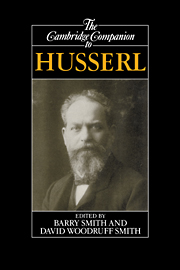Introduction
Published online by Cambridge University Press: 28 May 2006
Summary
HUSSERL’S PLACE IN THE HISTORY OF PHILOSOPHY
Edmund Husserl was born in 1859 in Moravia, then a part of the Habsburg Empire, now a part of the Czech Republic. He studied mathematics in Leipzig and Berlin, where he came into contact with the great German mathematician Karl Weierstrass. Encouraged by his friend and fellow Moravian T. G. Masaryk (also for a time in Leipzig and later first President of the erstwhile Republic of Czechoslovakia), Husserl attended lectures in philosophy given by Franz Brentano in Vienna. He devoted his life thereafter to what, from around 1908, he came to see as his “mission” - to transform philosophy into a rigorous science.
Husserl's philosophy, by the usual account, evolved through three stages. First, he overthrew a purportedly psychologistic position in the foundations of arithmetic, striving instead to establish anti-psychologistic, objective foundations of logic and mathematics. Second, he moved from a conception of philosophy as rooted in Brentanian descriptive psychology to the development of a new discipline of “phenomenology” and a metaphysical position dubbed “transcendental idealism”. And third, he transformed this phenomenology, which initially amounted to a form of methodological solipsism, into a phenomenology of intersubjectivity and ultimately (especially in his Crisis of 1936) into an ontology of the life-world, embracing the social worlds of culture and history.
- Type
- Chapter
- Information
- The Cambridge Companion to Husserl , pp. 1 - 44Publisher: Cambridge University PressPrint publication year: 1995
- 8
- Cited by



